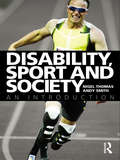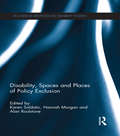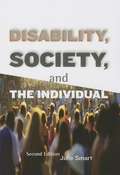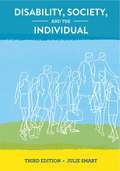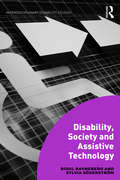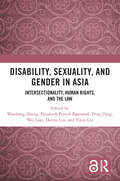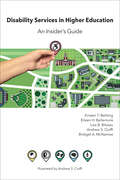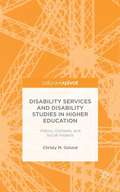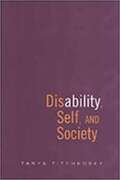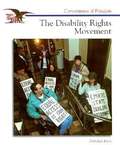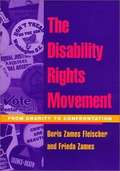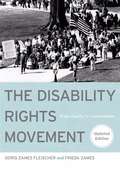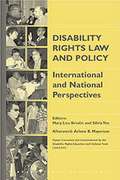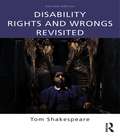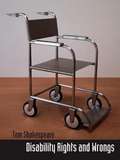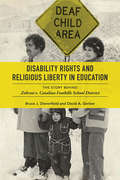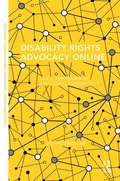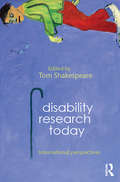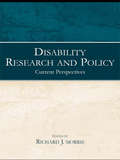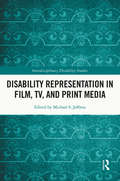- Table View
- List View
Disability Studies: Enabling the Humanities
by Sharon L. Snyder Brenda Jo Brueggemann Rosemarie Garland-ThomsonImages of disability pervade language and literature, yet disability is, as the volume's introduction notes, "the ubiquitous unspoken topic in contemporary culture." The twenty-five essays in Disability Studies provide perspectives on disabled people and on disability in the humanities, art, the media, medicine, psychology, the academy, and society.Edited and introduced by Sharon L. Snyder, Brenda Jo Brueggemann, and Rosemarie Garland-Thomson and containing an afterword by Michael Bérubé (author of Life As We Know It), the volume is rich in its cast of characters (including John Bulwer, Teresa de Cartagena, Audre Lorde, Oliver Sacks, Samuel Johnson, Mark Twain, Walt Whitman); in its powerful, authentic accounts of disabled conditions (deafness, blindness, MS, cancer, the absence of limbs); in its different settings (ancient Greece, medieval Spain, Nazi Germany, the modern United States); and in its mix of the intellectual and the emotional, of subtle theory and plainspoken autobiography.
Disability, Sport and Society: An Introduction
by Nigel Thomas Andy SmithDisability sport is a relatively recent phenomenon, yet it is also one that, particularly in the context of social inclusion, is attracting increasing political and academic interest. The purpose of this important new text – the first of its kind – is to introduce the reader to key concepts in disability and disability sport and to examine the complex relationships between modern sport, disability and other aspects of wider society. Drawing upon original data from interviews, surveys and policy documents, the book examines how disability sport has developed and is currently organised, and explores key themes, issues and concepts including: disability theory and policy the emergence and development of disability sport disability sport development in local authorities mainstreaming disability sport disability, physical education and school sport elite disability sport and the Paralympic Games disability sport and the media. Including chapter summaries, seminar questions and lists of key websites and further reading throughout, Sport, Disability and Society provides both an easy to follow introduction and a critical exploration of the key issues surrounding disability sport in the twenty-first century. This book is an invaluable resource for all students, researchers and professionals working in sport studies, disability studies, physical education, sociology and social policy. Nigel Thomas is Head of Sport and Exercise at Staffordshire University, UK, where his research focuses on the history, mainstreaming, and media coverage of disability sport. He previously worked for ten years with young disabled people as a sports development officer in local authorities and national governing bodies. Andy Smith is Lecturer in the Sociology of Sport and Exercise at the University of Chester, UK. He is a co-editor of the International Journal of Sport Policy, and a co-author of Sport Policy and Development: A Sociological Introduction, and An Introduction to Drugs in Sport: Addicted to Winning? Both books are published by Routledge (2009).
Disability-Specific Hassles: The Effects of Oppression on People with Disabilities
by Robin TimmThis study explored the nature of disability-specific stressors encountered by people with disabilities (PWD), examined the relationship between these unique events and psychological well-being, and determined the role that disability identity plays in the experience of stress. People with disabilities encounter many stressors comparable to those experienced by other minority groups including stigma, prejudice, and discrimination (Olkin. 1999). However, well-researched measures of stressful events have poorly captured the types of unique stressors experienced by PWD (Thoits, 1991). Therefore, this study developed a new measure, the Disability-Specific Hassles Scale(DSHS) to aid in identifying stressors and examining their impact on psychological well-being.
Disability, Spaces and Places of Policy Exclusion (Routledge Advances in Disability Studies)
by Alan Roulstone Karen Soldatic Hannah MorganGeographies of disability have become a key research priority for many disability scholars and geographers. This edited collection, incorporating the work of leading international disability researchers, seeks to expand the current geographical frame operating within the realm of disability. Providing a critical and comprehensive examination of disability and spatial processes of exclusion and inclusion for disabled people, the book uniquely brings together insights from disability studies, spatial geographies and social policy with the purpose of exploring how spatial factors shape, limit or enhance policy towards, and the experiences of, disabled people. Divided into two parts, the first section explores the key concepts to have emerged within the field of disability geographies, and their relationship to new policy regimes. New and emerging concepts within the field are critically explored for their significance in conceptually framing disability. The second section provides an in-depth examination of disabled people’s experience of changing landscapes within the onset of emerging disability policy regimes. It deals with how the various actors and stakeholders, such as governments, social care agencies, families and disabled people traverse these landscapes under the new conditions laid out by changing policy regimes. Crucially, the chapters examine the lived meaning of changing spatial relations for disabled people. Grounded in recent empirical research, and with a global focus, each of the chapters reveal how social policy domains are challenged or undermined by the spatial realities faced by disabled people, and expands existing understandings of disability. In turn, the book supports readers to grasp future policy directions and processes that enable disabled people's choices, rights and participation. This important work will be invaluable reading for students and researchers involved in disability, geography and social policy.
Disability, Society and the Individual (2nd Edition)
by Julie SmartThe purpose of this book is to look at the disability experience from the perspective of the individual who has a disability, to discuss how disabilities are viewed by society, and to consider the relationship between these two viewpoints.
Disability, Society, and the Individual
by Julie SmartThis unique book provides a comprehensive examination of the disability experience. The content focuses on definitions of disability, societal response to people with disabilities, and the experience of disability from the perspectives of individuals with disability. It is organized around broad themes rather than disability categories. With an engaging writing style and extensive and completely updated references, Disability, Society, and the Individual-Third Edition prepares the reader to understand and be able to use complex, important, and new ideas surrounding disability -- its experience and social and cultural context. The text includes discussion questions, learning activities, suggested readings, and first-person accounts. PART I--Definitions of Disability PART II--Society and Disability PART III--The Individual and Disability
Disability, Society, and the Individual
by Julie SmartThis is a textbook in a graduate rehabilitation counseling program. It is for a class called psycho-social aspects of disability
Disability, Society and Assistive Technology (Interdisciplinary Disability Studies)
by Bodil Ravneberg Sylvia SöderströmThe provision of assistive technology is an important individual and collective service of the welfare state. The state plays a significant role towards linking users and products, and the matching of devices and users is both a science and an art. However, many people feel it is stigmatising to use individually designed assistive technologies as they often, in a subtle way, convey discriminating barriers in society. The major challenges of assistive technology are thus to reduce social exclusion and marginalisation and, importantly, to reduce individual risks and societal costs related to non-use due to deficiencies in usability, aesthetics and design of the technologies. This groundbreaking book discusses the relationships among society, disability and technology by using different empirical examples (e.g., school, everyday life) to show why the combination of disability studies and STS-studies (science, technology and society) is a fruitful approach to understanding and meeting these challenges. The book explores the significance of the technologies for users, society and the field; identifies challenges to designing, adopting and using assistive technologies; and points at theoretical challenges in research as well as professional challenges in assistive technology service provision. The book also scrutinises the role of assistive technology devices, as well as the organisational structure of the assistive technology market, in relation to disabled people’s lives. This book will be valuable reading for students, academics, teachers and social educators interested in Disability Studies, STS Studies, Product Design, Sociology, Occupational Therapy and Physiotherapy, as well as engineers working in the field of assistive technology.
Disability, Sexuality, and Gender in Asia: Intersectionality, Human Rights, and the Law
by Wanhong Zhang, Elisabeth Perioli Bjørnstøl, Peng Ding, Wei Gao, Hanxu Liu and Yijun LiuThis book introduces experiential knowledge of the intersectionality of disability, sexuality, and gender equality issues. Scholars and disabled persons’ organizations in different Asian countries such as China, Vietnam, Myanmar, Nepal, and Japan have contributed to the book. It is a preliminary introduction of the frontline practice of Asian disability activism and the experience of women and LGBTIQ people with disabilities. It presents the direct participation of disability advocates in mapping how both women with disabilities and LGBTIQ individuals with disabilities realize their rights such as identity, work rights, personal safety, and sexual rights. Studies presented here explore the experience of empowering diverse disability groups and advocating for equality and non-discrimination. It explains how to use the leverage of the Convention on the Rights of Persons with Disabilities (CRPD) for further human rights campaigns in a broader context for disadvantaged groups. This collection is the product of a participatory research project, which aims to increase the capabilities of local disabled persons’ organizations and NGOs in utilizing human rights laws and encourage dialogue and collaboration between academia, people with disabilities, and human rights advocates. It will be essential reading for academics, researchers, policy-makers, and campaign groups.
Disability Services in Higher Education: An Insider's Guide
by Kirsten T. Behling, Eileen H. Bellemore, Lisa B. Bibeau, Andrew S. Cioffi, and Bridget A. McNameeDisability Services in Higher Education is the first comprehensive guide for people working in the field of ADA compliance in higher education. The authors examine how disabilities are supported to ensure students receive appropriate accommodations throughout their collegiate experience as well as provide guidance on overall campus accessibility. This volume provides an overview of the responsibilities of a Disabilities Service professional through an examination of relevant literature, laws and regulatory language, case law, and narrative on established practices. It also offers resources that current professionals can modify for use in their day-to-day practice immediately. The authors explore the complexities of accessibility, paying careful attention to the nuances of disability evaluation, accommodation decisions, management of a disability service office, advocating for resources and collaboration within and outside of higher education institutions. This practitioner-friendly book will help newcomers and seasoned professionals explore and evaluate best practices in the field through questions, examples, and functional job aids available for immediate use.
Disability Services and Disability Studies in Higher Education: History, Contexts, and Social Impacts
by Christy M. OslundChristy Oslund explores how the divide between disability studies and disability services, which exist on college and university campuses everywhere, impacts students with disability on campus.
Disability, Self, and Society
by Tanya TitchkoskyDisability, Self, and Society speaks with authenticity about disability as a process of identity formation within a culture that has done a great deal to de-emphasize the complexity of disability experience. <p><p> Unlike many who hold the conventional sociological view of disability as a 'lack' or stigmatized identity, Tanya Titchkosky approaches disability as an agentive (not passive) embodiment of liminality and as a demonstration of socially valuable in-between-ness. She argues that disability can and should be a 'teacher' to, and about, non-disabled or 'temporarily abled' society. <p><p> Titchkosky's poignant reflections on disability rely on the thought of Hannah Arendt as well as her personal experience as an individual with dyslexia living with a blind partner; she uniquely draws on her own and others' situations in order to demonstrate the sociopolitical character of disability. A thoughtful and cohesive integration of narrative and theory, Disability, Self, and Society presents a critical Canadian contribution to the growing subject of disability studies.
The Disability Rights Movement (Cornerstones of Freedom)
by Deborah KentAccording to 1990 census figures, about 43 million Americans, or one person out of every seven, have some form of disability. A disability is defined as any condition that limits a person's capacity to work or to perform tasks of daily living such as dressing, bathing, cooking, driving an automobile, or using a telephone. Judy Heumann, Paul Miller, and Ruth Sienkiewicz have widely varied disabling conditions. Yet they share one common bond. Each of them experienced the pain of discrimination. Though many challenges lie ahead, people with disabilities are becoming more visible on the streets, in the workplace, and in the media.
The Disability Rights Movement: From Charity To Confrontation
by Doris Z. Fleischer Freida Zames<P>Based on interviews with almost a hundred activists, this book provides a detailed history of the struggle for disability rights in the United States. It is a complex story of shifts in consciousness and shifts in policy, of changing focuses on particular disabilities such as blindness, deafness, polio, quadriplegia, psychiatric and developmental disabilities, chronic conditions (for example, cancer and heart disease), AIDS, and of activism and policymaking across disabilities. <P>Referring to the Americans with Disabilities Act as "every American's insurance policy," the authors recount the genesis of this civil rights approach to disability, from the almost forgotten disability activism of the 1930s, to the independent living movement of the 1970s, to the call for disability pride of the 1990s. Like other civil rights struggles, the disability rights movement took place in the streets and in the courts as activists fought for change in the schools, the workplace, and in the legal system. They continue to fight for effective access to the necessities of everyday life-to telephones, buses, planes, public buildings, restaurants, and toilets. <P>The history of disability rights mirrors the history of the country. Each World War sparked changes in disability policy and changes in medical technology as veterans without limbs and with other disabilities returned home. The empowerment of people with disabilities has become another chapter in the struggles over identity politics that began in the 1960s. <P>Today, with the expanding ability of people with disabilities to enter the workforce and a growing elderly population, issues like longterm care are becoming increasingly significant at a time when HMOs are trying to contain health care expenditures.
The Disability Rights Movement: From Charity to Confrontation, Updated Edition
by Doris Zames Fleischer Frieda ZamesA newly updated account of the struggle for disability rights in the U.S.
Disability Rights Law and Policy: International and National Perspectives
by Mary Lou Breslin Silvia YeeThis volume describes the extraordinary success of the international political movement of people with disabilities to include disability as a human rights issue. The authors are renowned disability rights attorneys, university professors, and activists who practice, teach and work internationally.
Disability Rights and Wrongs Revisited
by Tom ShakespeareOver the last forty years, the field of disability studies has emerged from the political activism of disabled people. In this challenging review of the field, leading disability academic and activist Tom Shakespeare argues that disability research needs a firmer conceptual and empirical footing. This new edition is updated throughout, reflecting Shakespeare’s most recent thinking, drawing on current research, and responding to controversies surrounding the first edition and the World Report on Disability, as well as incorporating new chapters on cultural disability studies, personal assistance, sexuality, and violence. Using a critical realist approach, Disability Rights and Wrongs Revisited promotes a pluralist, engaged and nuanced approach to disability. Key topics discussed include: dichotomies – going beyond dangerous polarizations such as medical model versus social model to achieve a complex, multi-factorial account of disability identity - the drawbacks of the disability movement's emphasis on identity politics bioethics - choices at the beginning and end of life and in the field of genetic and stem cell therapies relationships – feminist and virtue ethics approaches to questions of intimacy, assistance and friendship. This stimulating and accessible book challenges disability studies orthodoxy, promoting a new conceptualization of disability and fresh research agenda. It is an invaluable resource for researchers and students in disability studies and sociology, as well as professionals, policy makers and activists.
Disability Rights and Wrongs
by Tom ShakespeareBringing together Tom Shakespeare's innovative work from over the past ten years, 'Disability Rights and Wrongs' presents an analysis of the key issues in disability studies. The text examines issues such as biological and social factors, the challenge to medicine and genetics, rhetoric and empowerment.
Disability Rights and Wrongs
by Tom ShakespeareOver the last thirty years, the field of disability studies has emerged from the political activism of disabled people. In this challenging review of the field, leading disability academic and activist Tom Shakespeare argues that the social model theory has reached a dead end. Drawing on a critical realist perspective, Shakespeare promotes a pluralist, engaged and nuanced approach to disability. Key topics discussed include: dichotomies - the dangerous polarizations of medical model versus social model, impairment versus disability and disabled people versus non-disabled people identity - the drawbacks of the disability movement's emphasis on identity politics bioethics in disability - choices at the beginning and end of life and in the field of genetic and stem cell therapies care and social relationships - questions of intimacy and friendship. This stimulating and accessible book challenges orthodoxies in British disability studies, promoting a new conceptualization of disability and fresh research agenda. It is an invaluable resource for researchers and students in disability studies and sociology, as well as professionals, policy makers and activists.
Disability Rights and Religious Liberty in Education: The Story behind Zobrest v. Catalina Foothills School District (Disability Histories #12)
by Bruce J. Dierenfield David A. GerberIn 1988, Sandi and Larry Zobrest sued a suburban Tucson, Arizona, school district that had denied their hearing-impaired son a taxpayer-funded interpreter in his Roman Catholic high school. The Catalina Foothills School District argued that providing a public resource for a private, religious school created an unlawful crossover between church and state. The Zobrests, however, claimed that the district had infringed on both their First Amendment right to freedom of religion and the Individuals with Disabilities Education Act (IDEA). Bruce J. Dierenfield and David A. Gerber use the Zobrests' story to examine the complex history and jurisprudence of disability accommodation and educational mainstreaming. They look at the family's effort to acquire educational resources for their son starting in early childhood and the choices the Zobrests made to prepare him for life in the hearing world rather than the deaf community. Dierenfield and Gerber also analyze the thorny church-state issues and legal controversies that informed the case, its journey to the U.S. Supreme Court, and the impact of the high court's ruling on the course of disability accommodation and religious liberty.
Disability Rights and Religious Liberty in Education: The Story behind Zobrest v. Catalina Foothills School District (Disability Histories)
by Bruce J. Dierenfield David A. GerberIn 1988, Sandi and Larry Zobrest sued a suburban Tucson, Arizona, school district that had denied their hearing-impaired son a taxpayer-funded interpreter in his Roman Catholic high school. The Catalina Foothills School District argued that providing a public resource for a private, religious school created an unlawful crossover between church and state. The Zobrests, however, claimed that the district had infringed on both their First Amendment right to freedom of religion and the Individuals with Disabilities Education Act (IDEA). Bruce J. Dierenfield and David A. Gerber use the Zobrests' story to examine the complex history and jurisprudence of disability accommodation and educational mainstreaming. They look at the family's effort to acquire educational resources for their son starting in early childhood and the choices the Zobrests made to prepare him for life in the hearing world rather than the deaf community. Dierenfield and Gerber also analyze the thorny church-state issues and legal controversies that informed the case, its journey to the U.S. Supreme Court, and the impact of the high court's ruling on the course of disability accommodation and religious liberty.
Disability Rights Advocacy Online: Voice, Empowerment and Global Connectivity (Routledge Studies in Global Information, Politics and Society)
by Filippo TrevisanDisability rights advocates in the United Kingdom and the United States recently embraced new media technologies in unexpected and innovative ways. This book sheds light on this process of renewal and asks whether the digitalisation of disability rights advocacy can help re-configure political participation into a more inclusive experience for disabled Internet users, enhancing their stakes in democratic citizenship.
Disability Research Today: International Perspectives
by Tom ShakespeareGrouped around four central themes – illness and impairment, disabling processes, care and control, and communication and representations – this collection offers a fresh perspective on disability research, showing how theory and data can be brought together in new and exciting ways. Disability Research Today starts by showing how engaging with issues around illness and impairment is vital to a multidisciplinary understanding of disability as a social process. The second section explores factors that affect disabled people, such as homelessness, violence and unemployment. The third section turns to social care, and how disabled people are prevented from living with independence and dignity. Finally, the last section examines how different imagery and technology impacts our understandings of disability and deafness. Showcasing empirical work from a range of countries, including Japan, Norway, Italy, Australia, India, the UK, Turkey, Finland and Iceland, this collection shows how disability studies can be simultaneously sophisticated, accessible and policy-relevant. Disability Research Today is suitable for students and researchers in disability studies, sociology, social policy, social work, nursing and health studies.
Disability Research and Policy: Current Perspectives
by Richard J. MorrisThis book is based on research and scholarship produced by the Meyerson Disability Research Project (MDRP) at the University of Arizona. Its chapters are divided into two major sections: 1) Disability Research Areas and 2) Disability Policy Areas. The first section addresses some relatively new areas of research and scholarship with adults and children, such as the use of technology (e.g., videoconferencing and computer technology) in service delivery, whereas the second section critically examines various public policy and legal areas that impact the daily lives of many persons having a disability.
Disability Representation in Film, TV, and Print Media (Interdisciplinary Disability Studies)
by Michael S. JeffressUsing sources from a wide variety of print and digital media, this book discusses the need for ample and healthy portrayals of disability and neurodiversity in the media, as the primary way that most people learn about conditions. It contains 13 newly written chapters drawing on representations of disability in popular culture from film, television, and print media in both the Global North and the Global South, including the United States, Canada, India, and Kenya. Although disability is often framed using a limited range of stereotypical tropes such as victims, supercrips, or suffering patients, this book shows how disability and neurodiversity are making their way into more mainstream media productions and publications with movies, television shows, and books featuring prominent and even lead characters with disabilities or neurodiversity. Disability Representation in Film, TV, and Print Media will be of interest to all scholars and students of disability studies, cultural studies, film studies, gender studies, and sociology more broadly.

